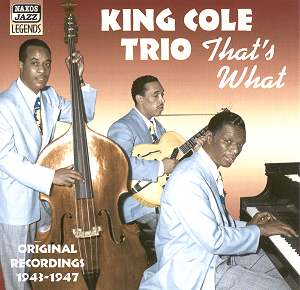Straighten Up and Fly Right (Cole) [2:26]
Gee Baby, Aint’I Good To You (Redman-Razaf)
[2:54]
If You Can’t Smile And Say Yes (Jordan-Rodgers)
[2:55]
The Man I Love (G. & I. Gershwin) [3:21]
Sweet Lorraine (Burwell-Parish) [3:12]
Body and Soul (Green-Heyman-Sour-Eyton) [3:19]
Embraceable You (G. & I. Gershwin) [3:23]
What Is This Thing Called Love? (Porter) [2:59]
Prelude in C Sharp Minor (Rachmaninov) [2:57]
It’s Only A Paper Moon (Arlen-Rose-Harburg)
[2:55]
Easy Listening Blues (Robinson) [3:08]
The Frim Fram Sauce (Ricardel-Evans) [3:15]
(Get Your Kicks On) Route 66 (Troup) [2:59]
You Call It Madness (But I Call It Love) (Cinrad-DuBois-Columbo-Gregory)
[3:02]
But She’s My Buddy’s Chick (Oliver-Atkinson)
[3:02]
(I Love You) For Sentimental Reasons (Best-Watson)
[2:51]
The Best Man (Alfred-Wise) [3:06]
You Don’t Learn That In School (Alfred-Fisher)
[3:05]
No Moon At All (Evans-Mann) [2:56]
That’s What (Cole) [2:25]
Nat ‘King’ Cole (piano, vocal)
Oscar Moore (guitar)
Johnny Miller (bass)
Anyone wanting to hear Nat
‘King’ Cole the jazz pianist, rather than
Nat ‘King’ Cole the ballad singer has to choose
pretty carefully where his recordings from
about 1950 onwards are concerned.
Where Cole’s recordings from
the 1940s are concerned, the jazz is altogether
easier to find. His trio – fairly early in
the line of piano trios – is essentially a
small jazz unit, on many of whose tracks Cole
adds a vocal chorus. Cole’s own piano work
is a constant joy. A less flamboyant version
of Earl Hines, with clear echoes of Teddy
Wilson, his is a lightly swinging piano with
a fairly light left hand and fluid, elegant
right-hand runs. His harmonic sense is quite
sophisticated and advanced for its time, anticipating
bebop in some ways. As a piano stylist his
influence can be hard in the work of later
pianists such as Red Garland, Ahmad Jamal
and Duke Jordan – perhaps even Bill Evans.
The innovative trio format of piano, guitar
and bass also spawned imitators – such as
trios led by Oscar Peterson and Jamal.
On these tracks – some of
the trio’s very finest recordings – the presence
of guitarist Oscar Moore is a real bonus.
Moore had an odd career, attracting relatively
little attention before his ten years with
Cole and then working largely as a studio
musician before eventually working as a bricklayer.
Moore is heard at something like his best
on these tracks, subtle and alert, his playing
drawing on the innovations of Charlie Christian.
Moore still seems to get less than his full
deserts from jazz historians – though he was
much praised by successors such as Barney
Kessel and Kenny Burrell.
Beyond the quality of the
best solos, the music on this CD is characterised
by the tremendous sense of group cohesion.
Count Basie is reported to have said of the
trio, "those cats used to read each other’s
minds – it was unbelievable" and certainly
there is impressive interplay here, which
plays an important part in the trio’s capacity
to produce music which sounds simultaneously
spontaneous and beautifully smooth.
Amiable as Cole’s voice is,
his singing is, for the most part, oddly unjazz-like,
though it certainly has a ‘cool’ quality;
at least two of these tracks – ‘Straighten
Up And Fly Right’ and ‘The Frim Fram Sauce’
are decidedly ‘hip’. But for me it is the
instrumental work that is the great pleasure
of this CD. Several tracks – including a wonderfully
sensitive ‘Body and Soul’ and a bouncily elegant
‘What Is This Thing Called Love’ – are purely
instrumental tracks; on others there are superb
choruses from both Cole and Moore.
With the sound very well
restored, this is an excellent collection,
full of high-class music.
Glyn Pursglove
